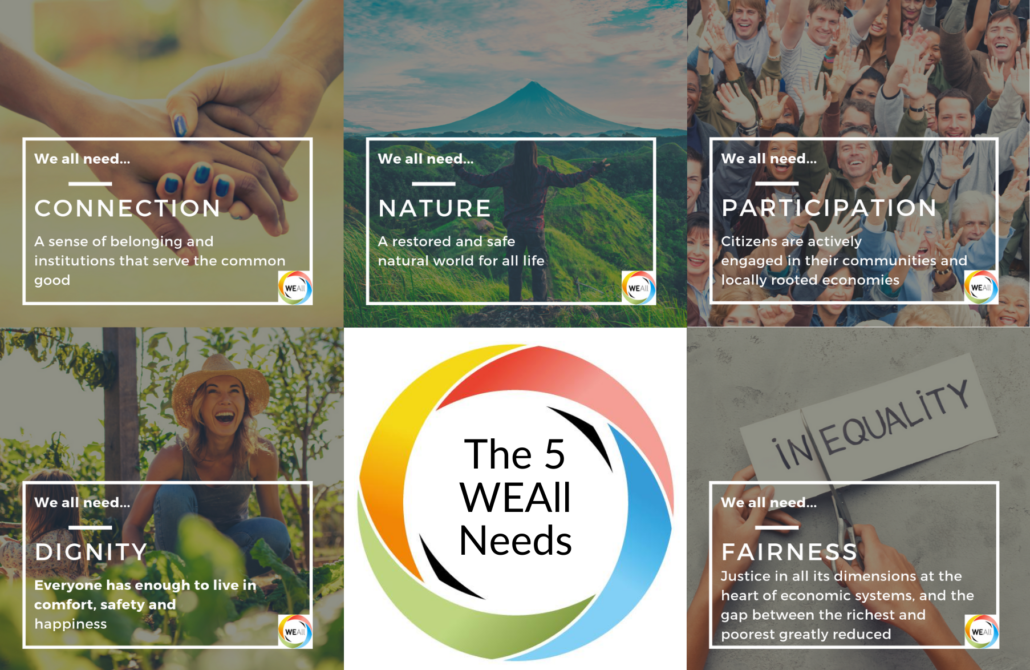by Rabia Abrar
Recent comments made by Benny Higgins, the chairman of Nicola Sturgeon’s advisory group on economic recovery, have caused quite a stir. WEAll would like to address his claims about how growth is the best way to build a fairer, greener and more equal Scotland.
“A market economy is well capable of responding to environmental change and delivering wellbeing”.
The current state of the world is proof that this is not the case.
The economic model that dominates policy making has strangled our imaginations and our sense of possibility: the current economy is seen as the only kind of economy that we can have – and changing it would bring society to its knees. But, we’re already there.
Our world is facing multiple crises: rising inequality, accelerating climate breakdown and rapid biodiversity loss. These issues are interconnected and stem from the same core problem: our economies are structured, governed, and measured to promote short-term growth over long-term stability.
A focus on ‘growth’ is not supporting the wellbeing of society. That’s why we see widening economic inequalities; increasing levels of insecurity, despair and loneliness; and the emergence of coping mechanisms that turn people inwards or against each other – all while trust in institutions withers away.
A focus on ‘growth’ is not supporting the wellbeing of our planet. Our home is on the brink of the 6th mass extinction with the prospect of catastrophic climate breakdown getting closer and closer. In the last 40 years, humanity as a whole has gone from using one planet’s worth of natural resources each year, to using one and a half, and is on course to using three planets worth by 2050.
Governments have responded to both crises with a suite of (often inadequate) amelioration measures, such as:
- Redistributing after the gap between the wealthiest and the poorest has opened up
- Cleaning up after floods and storms caused by climate change
- Providing respiratory medicines after peoples’ asthma is exacerbated by pollution
While these are vital measures to help people cope with today’s circumstances – they are reactive measures that could be avoided in a wellbeing economy, which attends to their root causes.
“The recovery for Scotland has to be green, it has to be fair and it needs to be inclusive, but it needs to have economic growth”.
We disagree that a wellbeing economy is about generating “strong economic growth”.
A wellbeing economy would ask: “What sort of growth – and for whom – is needed for collective wellbeing? What sort of lives do people want to live and what sort of economy can enable that?”
Simply adding ‘inclusive’ and ‘green’ modifiers to ‘growth’ does not answer either of these vital questions.
In a true wellbeing economy approach, business, politics and economic activity would exist solely to deliver collective wellbeing – while being agnostic to economic growth, not dependent on it.
We are not against growth in GDP per se, but we are against the idea that GDP growth should be the top priority. We should only pursue growth in those areas of the economy that contribute to collective wellbeing and shrink those areas of the economy that damage it.
We do not need growth in GDP to achieve wellbeing.
What we need to be happy is security, comfort, social connections, a healthy environment and a feeling of belonging in our community(ies).
“A wellbeing economy needs growth to pay for itself”.
Growing GDP is incredibly expensive.
In our current economic system, growth in GDP is demanded as a means to pay for services that people need. But very often, these services are needed to fix the harm to people, communities and the environment that is created by a growth-driven economy. The costs of this ‘failure demand’ are enormous. For example, poverty in the UK alone, costs £78 billion every year.
A wellbeing economy would deliver good lives for people the first time around, and thus avoid having to deliver expensive down-stream interventions to fix the damage caused by growth-focused economies.
While avoiding these costs, wellbeing economy policies could also deliver benefits such as job creation in a growing renewables sector and the circular economy; improvements in health and economic and social resilience due to better environmental quality and equality.
Building a fairer, greener and more equal Scotland will require a different approach.
Decisions made in times of crisis have long-lasting consequences. After the 2008 financial crisis, inequality grew, and climate emissions spiralled. We want to see this moment seized for the common good, not to repeat the mistakes of the past.
The recovery period following the COVID-19 pandemic is a window of opportunity for Scotland to lead the world in truly putting collective wellbeing at the heart of economic policy making.
Imagine an economy, that by its very design, ended inequality and environmental destruction and delivered good lives for everyone, everywhere.
That’s better than growth.
Rabia Abrar
Communications Lead, WEAll.
#BuildBackBetterScot #BuildBackBetter #betterthangrowth
the discussion?
Let us know what
you would like
to write about!

